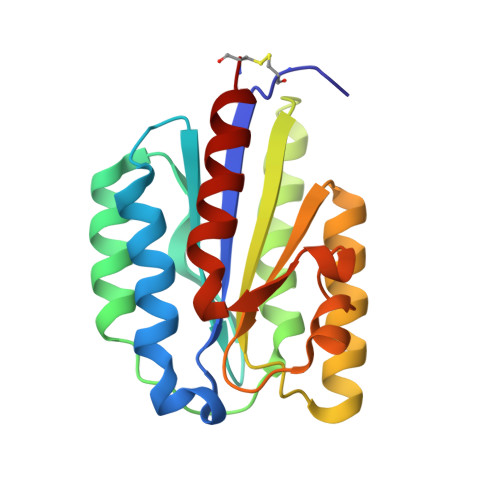The structure of tumor endothelial marker 8 (TEM8) extracellular domain and implications for its receptor function for recognizing anthrax toxin.
Fu, S., Tong, X., Cai, C., Zhao, Y., Wu, Y., Li, Y., Xu, J., Zhang, X.C., Xu, L., Chen, W., Rao, Z.(2010) PLoS One 5: e11203-e11203
- PubMed: 20585457
- DOI: https://doi.org/10.1371/journal.pone.0011203
- Primary Citation of Related Structures:
3N2N - PubMed Abstract:
Anthrax toxin, which is released from the gram-positive bacterium Bacillus anthracis, is composed of three proteins: protective antigen (PA), lethal factor (LF), and edema factor (EF). PA binds a receptor on the surface of the target cell and further assembles into a homo-heptameric pore through which EF and LF translocate into the cytosol. Two distinct cellular receptors for anthrax toxin, TEM8/ANTXR1 and CMG2/ANTXR2, have been identified, and it is known that their extracellular domains bind PA with low and high affinities, respectively. Here, we report the crystal structure of the TEM8 extracellular vWA domain at 1.7 A resolution. The overall structure has a typical integrin fold and is similar to that of the previously published CMG2 structure. In addition, using structure-based mutagenesis, we demonstrate that the putative interface region of TEM8 with PA (consisting of residues 56, 57, and 154-160) is responsible for the PA-binding affinity differences between the two receptors. In particular, Leu56 was shown to be a key factor for the lower affinity of TEM8 towards PA compared with CMG2. Because of its high affinity for PA and low expression in normal tissues, an isolated extracellular vWA domain of the L56A TEM8 variant may serve as a potent antitoxin and a potential therapeutic treatment for anthrax infection. Moreover, as TEM8 is often over-expressed in tumor cells, our TEM8 crystal structure may provide new insights into how to design PA mutants that preferentially target tumor cells.
Organizational Affiliation:
National Laboratory of Biomacromolecules, Institute of Biophysics, Chinese Academy of Sciences, Beijing, China.
















